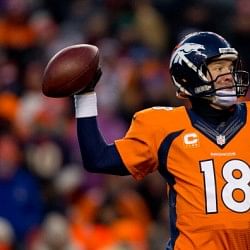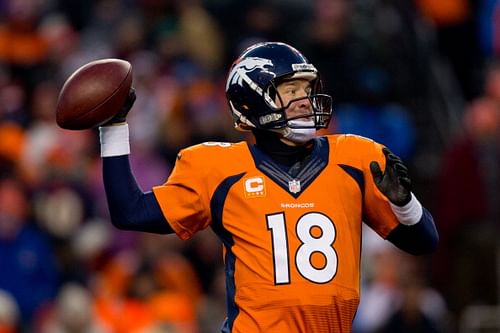
What it means to be Peyton Manning

Quarterback Peyton Manning #18 of the Denver Broncos throws a pass during the third quarter against the Tennessee Titans at Sports Authority Field Field at Mile High on December 8, 2013 in Denver, Colorado. The Broncos defeated the Titans 51-28.
“Like Mike, if I could be like Mike.” If you are under the age of 30, then this lyrical theme and memorable melody is completely foreign to you. I’ll throw you a bone.
“I. Am. Malcolm X.”
Familiar? End of Spike Lee’s epic movie about the iconic civil rights acitvist? Again, if you are under 30, I understand. If you are under 30, then the social media age has taught you to follow as opposed to lead, to trail behind as opposed to emulate. Well, I’m 34 and I live to be the best at what I do and who I am. I. AM. PEYTON MANNING.
There is something about the competitive nature of sports that resides with comfort in our DNA. Life is competitive. In grade school you compete to be accepted by your peers. In high school, you compete for prom king. In college, you compete to establish your niche and prepare for the world of employment. We compete for promotions. We compete for attention. We compete for acceptance. We compete trying to survive day to day. We compete to maintain whatever lifestyle we have. Competition is an intrinsic subtext to life. The difference between those of us who are die-hard fans of sports and those who look at us as hopeless and ridiculous is that our competitive drive is a little higher and stronger. Thus, we live vicariously through sports. We call out from work dispirited and even despondent after a devastating loss by one of our teams or favorites. Drinks are on the house when our team wins as the elation triumphs any fiduciary matters.
We hate the neighbor in such defeats. We love our enemies after victory. Our teams lose a game. We lose in life. Somehow the interception thrown for a pick-six to cost us the game sends us to our knees in agony because life affords us memories and, unfortunately, the memories that bully their way to the forefront of our minds are those of disappointment and pain.
Consequently, the game-losing interception is a stimulant for all of the times we almost did it or we almost had the job or almost had the girl.
Even more, our sports heroes reflect so many things about us. In other words, we often choose them because we see parallels between us and them in our mannerisms, personality, and even skillsets (if we also play sports). In fact, living vicariously through them, for us, sets in motion that their essence and being can invade our spirit. For me, this was evident as a young boy when Magic Johnson was my hero. I not only patterned my basketball game after Magic’s but eventually Magic became so much a part of me that I developed a little bit of his personality (the smile, the happy-go-lucky flare). More importantly, Magic was a winner. He was a collegiate champion and NBA champion. On a lesser level, in the leagues I played in, I was a driving force behind teams that were winners. My youth teams won championships and lost very few games. I was an All-Star and the crowning achievement was when the basketball community began calling me “Magic” (a nickname some back home still call me to this day).
Peyton Manning is a winner as well in a more complex and esoteric way. Along with Tim Duncan he is my modern day sports hero. Manning had a record setting 2013-14 campaign with 55 regular season touchdown passes and 5,477 passing yards, eclipsing Tom Brady’s TD mark in 2007 and Drew Brees’ yardage record in 2011. Both of these records were almost indelibly attached to Dan Marino. Manning now has 491 career TD passes, which is second all time to Brett Favre’s 508. He has a whopping 64,964 passing yards, also second to Favre’s 71,738 yards. In spite of his detractors and his eight first-playoff-game exits–after normally dominant regular season performances by he and his teams–he does have a Super Bowl win, something his most similar predecessor Dan Marino does not have.
Yet, the critics will say that he falls behind the greatness of quarterbacks like Joe Montana and Tom Brady who have multiple Super Bowl wins. The critics will point to his 9 wins and 11 losses in the playoffs entering the 2014 playoff run. The critics will say he fails to display the sheer football supremacy he has showcased so often in the regular season. Legendary sportswriter and ESPN First Take’s Skip Bayless has respectfully crowned him “the greatest regular season QB ever.” Many pundits have actually come around to at least share this belief.